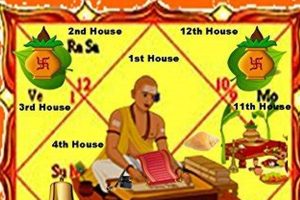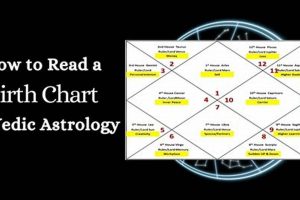Vedic astrology analyzes planetary positions and their influence on individuals’ lives, including predispositions to certain health conditions. This ancient system associates the zodiac sign Cancer, a water sign ruled by the Moon, with emotional sensitivity and nurturing qualities. Examining the Moon’s placement in a natal chart, alongside other planetary aspects, provides insights into potential health vulnerabilities, including those related to the chest, stomach, and emotional well-being.
This approach offers a unique perspective on health by connecting physical manifestations with emotional and psychological factors. By understanding these connections, individuals can potentially mitigate risks and adopt preventative measures aligned with their specific astrological profile. This practice has roots in ancient Indian traditions and continues to be a significant aspect of Vedic astrology.
Further exploration of this topic will cover specific planetary influences, their implications for health, and potential remedial measures suggested within the Vedic system. This includes a detailed look at the significance of the Moon’s placement in various houses and its interactions with other planets.
Vedic astrology offers potential insights for proactive health management by considering planetary influences. These tips offer guidance for individuals seeking to understand and address potential vulnerabilities associated with the sign Cancer and its ruling planet, the Moon.
Tip 1: Prioritize Emotional Well-being: Given the Moon’s influence on emotions, maintaining emotional balance is crucial. Practices like meditation, journaling, and spending time in nature can foster emotional stability.
Tip 2: Nurture the Digestive System: Cancer governs the stomach. Adopting a balanced diet rich in easily digestible foods is recommended. Consider exploring traditional dietary principles aligned with Vedic astrology.
Tip 3: Pay Attention to Lunar Cycles: The Moon’s phases can impact energy levels and emotional states. Adapting daily routines to align with these cycles can promote well-being.
Tip 4: Seek Expert Guidance: Consulting with experienced Vedic astrologers can provide personalized insights based on individual birth charts. This personalized guidance can assist in understanding specific planetary influences and developing tailored health strategies.
Tip 5: Incorporate Ayurvedic Practices: Ayurveda, a traditional Indian system of medicine, complements Vedic astrology. Incorporating Ayurvedic principles, such as herbal remedies and lifestyle adjustments, can further support overall health.
By integrating these tips, individuals can proactively address potential health concerns and cultivate a holistic approach to well-being guided by Vedic astrological principles.
These insights provide a foundation for informed decision-making and encourage a proactive approach to health management. Further exploration can delve into specific remedies and personalized strategies based on individual astrological charts.
1. Moon's Influence
The Moon holds paramount importance in Vedic astrology, particularly concerning individuals with Cancer placements. As the ruling planet of Cancer, the Moon governs emotions, instincts, and the subconscious mind. Its placement in a natal chart significantly influences an individual’s emotional landscape, shaping their responses to external stimuli and internal processes. This influence manifests in varying ways depending on the Moon’s position in houses and its relationship with other celestial bodies. For instance, a Moon conjunct malefic planets might indicate emotional volatility or difficulty processing feelings, whereas a benefic aspect could suggest emotional stability and resilience. Understanding the Moon’s influence provides a foundation for interpreting the emotional dynamics within a chart, especially for those born under the sign of Cancer.
The Moon’s influence extends beyond general emotional tendencies. It also connects to the physical body, particularly areas governed by Cancer, such as the chest, stomach, and fluids within the body. Lunar cycles can impact physiological processes, influencing energy levels and overall well-being. This cyclical influence reflects the ebb and flow of lunar phases, impacting an individual’s vitality and emotional state. Consider an individual with a Cancer ascendant experiencing a full moon transit. They might experience heightened emotional sensitivity or fluctuations in energy levels corresponding to the lunar cycle. Recognizing these connections offers valuable insights into potential health vulnerabilities and provides opportunities for proactive health management through lifestyle adjustments aligned with lunar rhythms.
In essence, the Moon acts as a lens through which emotional and physical experiences are processed for those influenced by Cancer. Analyzing its placement and aspects within a natal chart unlocks deeper understanding of an individual’s emotional nature, potential health predispositions, and overall life path. Challenges may arise in interpreting subtle nuances of lunar influences, necessitating careful consideration of various astrological factors. This intricate interplay underscores the Moon’s pivotal role in Vedic astrology, particularly its profound connection to the sign of Cancer. Further exploration of specific lunar placements and their implications can enhance understanding and application of these astrological principles.
2. Emotional Sensitivity
Emotional sensitivity forms a cornerstone of the Cancer archetype in Vedic astrology. Ruled by the Moon, the celestial body governing emotions and instincts, Cancer individuals often exhibit heightened emotional responsiveness. This sensitivity stems from the Moon’s influence, impacting their perception and reactions to external stimuli and internal experiences. Cause and effect intertwine; the Moon’s position in a natal chart, its aspects to other planets, and the overall astrological landscape contribute to the degree and expression of emotional sensitivity. For instance, a Moon afflicted by Mars might manifest as impulsive emotional reactions, while a Moon aspected by Jupiter could indicate emotional generosity and optimism. Real-life examples abound, with individuals born under Cancer often displaying profound empathy, intuitive understanding of others’ feelings, and a tendency towards nurturing and protective behaviors. This emotional depth, while a strength, can also present challenges when navigating emotionally charged situations or dealing with personal vulnerabilities.
Emotional sensitivity plays a vital role in the overall interpretation of a Cancer-influenced chart. It serves as a lens through which experiences are processed, influencing decision-making, interpersonal relationships, and overall life trajectory. Understanding this sensitivity is crucial for comprehending the motivations and behaviors of individuals with prominent Cancer placements. Practically, this understanding fosters empathy and facilitates effective communication with Cancer individuals. Recognizing their emotional needs and potential triggers allows for more harmonious interactions and strengthens interpersonal bonds. This knowledge extends beyond personal relationships, informing professional collaborations and interactions within broader social contexts. For instance, understanding a Cancer colleague’s emotional responsiveness can enhance teamwork and create a more supportive work environment.
In summary, emotional sensitivity, deeply intertwined with the Cancer archetype in Vedic astrology, represents a significant factor influencing individuals’ emotional landscapes and life experiences. While challenges such as emotional vulnerability and susceptibility to external influences exist, the inherent empathy and intuitive understanding associated with this sensitivity offer valuable strengths in navigating the complexities of human interaction. Recognizing and appreciating the nuances of emotional sensitivity in the context of Cancer Vedic astrology provides a pathway to deeper understanding, both of oneself and others.
3. Water Sign Energy
Water sign energy, a fundamental concept in Vedic astrology, plays a crucial role in understanding the characteristics associated with the sign of Cancer. This energy governs emotional depth, intuition, and sensitivity, shaping the inner world of individuals influenced by this watery domain. Exploring the facets of water sign energy provides insights into the emotional landscape and behavioral tendencies associated with Cancer.
- Emotional Depth:
Cancer, as a water sign, embodies emotional depth. This translates to a profound capacity for experiencing and processing emotions, often leading to heightened empathy and intuitive understanding of others’ feelings. Individuals with prominent Cancer placements might experience a wide range of emotions intensely. This emotional depth can be a source of strength, enabling profound connections and compassionate interactions, but it can also present challenges in navigating emotionally turbulent situations. For instance, someone with a Cancer Sun might exhibit deep empathy for a friend going through hardship, offering unwavering support and understanding. Conversely, they might also experience emotional overwhelm in stressful environments, requiring conscious self-care and emotional regulation.
- Intuition and Sensitivity:
Water signs are associated with heightened intuition and sensitivity. Cancer individuals often possess a strong inner knowing, a capacity to perceive subtle emotional currents and unspoken cues. This intuitive nature can guide their decision-making and interactions, allowing them to navigate social situations with awareness and empathy. However, this sensitivity can also make them more susceptible to external influences and emotional fluctuations in their environment. An example might be a Cancer Moon individual sensing tension in a room even before a conflict arises, allowing them to address the situation proactively or remove themselves from a potentially uncomfortable environment.
- Nurturing and Caring:
Nurturing and caring tendencies represent another key aspect of water sign energy, particularly prominent in Cancer. This nurturing instinct often manifests as a desire to protect and care for others, creating a sense of emotional security and belonging. Cancer individuals often excel in roles requiring empathy and emotional support, such as caregivers, counselors, or teachers. This inherent nurturing nature can extend to various aspects of life, from family relationships to professional endeavors. A Cancer rising individual, for instance, might create a warm and welcoming home environment, prioritizing the emotional well-being of their family members.
- Fluidity and Adaptability:
Like water itself, water sign energy embodies fluidity and adaptability. Cancer individuals often demonstrate resilience in navigating changing circumstances, adjusting their emotional responses and behaviors as needed. This adaptability can be a valuable asset in overcoming challenges and adapting to new environments. However, it can also manifest as a tendency to absorb the emotions of others, requiring conscious boundaries and self-protective practices. Someone with a Cancer Mars, for example, might adjust their communication style depending on the emotional needs of the person they are interacting with, demonstrating flexibility and emotional intelligence.
These facets of water sign energy, interwoven within the astrological framework of Cancer, contribute to a complex and nuanced understanding of this zodiac sign. The interplay of emotional depth, intuition, nurturing tendencies, and adaptability shapes the unique emotional landscape and behavioral patterns associated with Cancer. Further exploration of these facets within individual birth charts provides personalized insights into the expression of Cancerian energy and its influence on an individual’s life path.
4. Fourth House Significance
The fourth house in Vedic astrology holds profound significance, particularly regarding its connection with the sign of Cancer. This house represents the foundation of life, encompassing home, family, emotional security, and one’s roots. Cancer, as the natural ruler of the fourth house, imbues this domain with its nurturing, sensitive, and emotionally driven qualities. This connection creates a powerful interplay, influencing an individual’s sense of belonging, emotional well-being, and connection to family lineage. Cause and effect intertwine; the planetary placements within the fourth house, particularly the position of the Moon, Cancer’s ruling planet, significantly impact the expression of these themes. For instance, a benefic planet like Jupiter in the fourth house might indicate a harmonious home life and strong family bonds, while a malefic placement could suggest emotional turbulence or challenges related to family dynamics. A real-life example might involve an individual with Saturn in the fourth house experiencing delays or difficulties related to property matters or feeling a sense of responsibility towards their family that weighs heavily on them.
The fourth house’s significance extends beyond the immediate family, encompassing one’s emotional foundation and sense of security. It represents the inner world, the private domain where emotions are processed and nurtured. This connection to the inner self highlights the importance of emotional well-being and creating a stable, nurturing environment for oneself. Practical applications of this understanding involve recognizing the influence of the fourth house on emotional patterns and seeking ways to create a sense of stability and security in one’s life. This could involve practices like meditation, creating a peaceful home environment, or exploring family history to understand ancestral patterns. The fourth house also represents the end of life, suggesting the importance of emotional closure and finding peace within oneself as one approaches the later stages of life. This perspective emphasizes the significance of emotional well-being throughout life, not just in the present moment.
In summary, the fourth house, deeply connected to the sign of Cancer in Vedic astrology, represents a crucial domain influencing an individual’s emotional foundation, family connections, and sense of security. Understanding the interplay between planetary placements within this house and the nurturing qualities of Cancer provides valuable insights into an individual’s emotional landscape. Challenges might arise in interpreting complex planetary combinations or addressing difficult family dynamics, but the insights gained from understanding the fourth house offer valuable guidance in navigating these challenges and cultivating a deeper understanding of oneself and one’s roots. This understanding emphasizes the importance of nurturing one’s emotional well-being and creating a supportive environment for oneself and one’s family, contributing to a more fulfilling and balanced life.
5. Maternal Connections
Maternal connections hold significant weight within Vedic astrology, particularly concerning the sign of Cancer. As the natural ruler of the fourth house, associated with home, family, and emotional foundations, Cancer embodies nurturing qualities often linked with maternal figures. Exploring this connection provides insights into how Vedic astrology interprets maternal influences and their impact on individuals, especially those with prominent Cancer placements.
- The Moon’s Role:
The Moon, as the ruler of Cancer, plays a crucial role in understanding maternal connections in Vedic astrology. Its placement in a birth chart reflects the nature of the maternal relationship and the individual’s emotional connection to their mother or mother figures. A well-placed Moon often suggests a strong, supportive bond, while an afflicted Moon might indicate emotional challenges or difficulties in the relationship. For example, a Moon conjunct beneficial planets in the fourth house could signify a nurturing and emotionally secure upbringing, whereas a Moon afflicted by malefic planets in the same house might point towards emotional volatility or distance in the maternal relationship.
- Emotional Imprinting:
Vedic astrology suggests that early childhood experiences, particularly interactions with the mother, significantly shape emotional development. This “emotional imprinting” influences an individual’s emotional responses, attachment styles, and capacity for intimacy throughout life. Cancer, being a water sign associated with emotional depth, emphasizes this imprinting process. A person with a Cancer ascendant, for instance, might be particularly sensitive to their mother’s emotional state during their formative years, impacting their own emotional development and relational patterns in adulthood.
- Ancestral Lineage:
The fourth house, ruled by Cancer, also connects to ancestral lineage and family history, particularly through the maternal line. Vedic astrology explores how ancestral patterns, especially those related to the feminine lineage, might influence an individual’s life path and emotional predispositions. This perspective suggests that understanding family history, particularly maternal ancestors, can provide valuable insights into recurring emotional themes or behavioral patterns. For instance, exploring the life experiences of maternal grandmothers or great-grandmothers could reveal recurring emotional patterns or inherited strengths and vulnerabilities.
- Nurturing Instincts:
Cancer’s association with nurturing qualities extends beyond the mother-child relationship, influencing an individual’s capacity for caregiving and empathy towards others. Individuals with prominent Cancer placements often exhibit strong nurturing instincts, finding fulfillment in caring for others and creating emotionally supportive environments. This nurturing energy can manifest in various ways, from professional roles in caregiving professions to creating a warm and loving home environment for their own families. A person with a Cancer Sun, for example, might naturally gravitate towards roles involving nurturing and emotional support, such as counseling, teaching, or healthcare.
These facets of maternal connections, viewed through the lens of Cancer Vedic astrology, contribute to a more nuanced understanding of an individual’s emotional landscape and familial influences. Exploring the Moon’s placement, emotional imprinting, ancestral lineage, and nurturing instincts provides valuable insights into how maternal connections shape an individual’s life path and emotional well-being. These insights can be further explored through a detailed analysis of an individual’s birth chart, offering personalized guidance and understanding of these complex dynamics.
6. Digestive Health
Vedic astrology links Cancer with the stomach and, consequently, digestive health. The Moon, ruling planet of Cancer, influences physiological processes related to digestion and nutrient absorption. Its placement in a natal chart, along with aspects to other planets, offers insights into potential digestive vulnerabilities. A debilitated Moon or challenging planetary aspects can indicate predispositions to digestive issues, ranging from sensitivities to chronic conditions. Conversely, a well-placed and aspected Moon may suggest robust digestive function. For example, an afflicted Moon in Cancer might manifest as digestive discomfort or food intolerances, while a harmonious Moon could indicate strong digestion and efficient nutrient assimilation.
This connection between Cancer and digestion highlights the importance of dietary awareness for individuals with prominent Cancer placements. Vedic astrology suggests adopting dietary practices aligned with one’s astrological profile to mitigate potential digestive vulnerabilities. This includes favoring easily digestible foods, incorporating traditional dietary principles, and adapting eating habits to lunar cycles. This approach emphasizes preventative measures and lifestyle adjustments to support digestive well-being. For instance, individuals with a Cancer ascendant might benefit from incorporating cooling, easily digestible foods into their diet, particularly during periods of emotional stress or lunar transits impacting the sign of Cancer.
Understanding the link between Cancer and digestive health in Vedic astrology provides a framework for proactive health management. This includes recognizing potential digestive vulnerabilities indicated in a birth chart and adopting dietary and lifestyle practices to support digestive function. While addressing specific digestive issues may require professional medical guidance, Vedic astrology offers a complementary approach, emphasizing preventative care and a holistic understanding of the interplay between planetary influences and physical well-being. Challenges lie in interpreting complex astrological factors and tailoring dietary recommendations to individual needs. However, the insights gained offer valuable guidance for individuals seeking to enhance their digestive health through an astrologically informed approach.
7. Nurturing Tendencies
Nurturing tendencies form a core aspect of Cancer’s archetype in Vedic astrology. This inclination to care for and protect others stems from the sign’s association with the Moon, the celestial body governing emotions and instincts, and the fourth house, representing home, family, and emotional security. Examining the facets of these nurturing tendencies provides deeper insights into Cancer’s influence on individuals’ behavior and interpersonal relationships.
- Emotional Support:
Cancer individuals often excel at providing emotional support. Their empathetic nature and intuitive understanding of others’ feelings allow them to offer comfort and guidance during challenging times. This can manifest as active listening, offering practical advice, or simply providing a safe space for emotional expression. For example, a Cancer friend might intuitively sense a loved one’s emotional distress and offer unwavering support during a difficult period. This emotional support often strengthens bonds and fosters deep connections within their relationships.
- Creating a Secure Environment:
The nurturing tendencies associated with Cancer extend to creating secure and comfortable environments for themselves and loved ones. This can manifest in various ways, from maintaining a tidy and welcoming home to fostering a sense of emotional safety within their relationships. They prioritize creating spaces where individuals feel protected and nurtured. A Cancer parent, for instance, might prioritize establishing a stable and loving home environment for their children, fostering a sense of security and belonging.
- Protective Instincts:
Cancer individuals often display strong protective instincts, particularly towards those they care about. This protective nature can manifest as defending loved ones from harm, advocating for their needs, or simply offering guidance and support. These individuals often act as guardians, ensuring the well-being and safety of those within their circle of care. For example, a Cancer colleague might defend a coworker against unfair criticism, demonstrating their protective instincts and loyalty.
- Caregiving Roles:
The nurturing tendencies associated with Cancer often lead individuals towards caregiving roles. Their empathetic nature and desire to nurture others make them well-suited for professions involving care and support, such as nursing, teaching, counseling, or social work. In these roles, their inherent nurturing qualities find expression, contributing to the well-being of those they serve. A Cancer individual might find deep fulfillment working as a therapist, providing emotional support and guidance to clients navigating challenging life experiences.
These nurturing tendencies, deeply rooted in the astrological symbolism of Cancer, play a significant role in shaping individuals’ interactions and life paths. While challenges like emotional overextension or difficulty setting boundaries can arise, these nurturing qualities represent a core strength, fostering deep connections and contributing to a sense of belonging and emotional security within relationships and communities. This understanding further illuminates the complexities of the Cancer archetype in Vedic astrology and its influence on interpersonal dynamics.
Frequently Asked Questions about Cancer in Vedic Astrology
This section addresses common inquiries regarding the influence of Cancer in Vedic astrology, focusing on its association with health and emotional well-being.
Question 1: Does a Cancer placement guarantee health problems?
A Cancer placement does not guarantee health issues. Vedic astrology suggests potential vulnerabilities, not certainties. Planetary placements and lifestyle choices contribute to overall health outcomes.
Question 2: How does the Moon’s position influence Cancer’s health?
The Moon’s placement in a birth chart, along with its aspects to other planets, influences emotional and physical well-being. A well-placed Moon generally supports good health, while an afflicted Moon may indicate vulnerabilities.
Question 3: Can Vedic astrology predict specific health events?
Vedic astrology does not predict specific health events. It offers insights into potential predispositions. Professional medical advice should be sought for diagnosis and treatment.
Question 4: Are there remedies in Vedic astrology for health concerns?
Vedic astrology suggests remedial measures, including gemstone recommendations, mantra chanting, and lifestyle adjustments, to mitigate potential health challenges. Consulting an experienced Vedic astrologer is advisable for personalized guidance.
Question 5: How does Cancer’s emotional nature affect health?
Cancer’s association with emotional sensitivity highlights the mind-body connection. Emotional well-being significantly impacts physical health. Managing stress and cultivating emotional balance are crucial for individuals with prominent Cancer placements.
Question 6: What role does diet play in Cancer’s health according to Vedic astrology?
Vedic astrology emphasizes dietary awareness for Cancer individuals. Consuming easily digestible foods and adapting dietary habits based on astrological insights can support digestive health and overall well-being.
Understanding the interplay between Cancer and Vedic astrology provides a framework for proactive health management. Consulting qualified professionals, both medical and astrological, offers comprehensive guidance for individual well-being.
Further exploration may involve personalized chart analysis or in-depth study of specific planetary influences.
Cancer Vedic Astrology
Exploration of this topic has revealed the multifaceted connections between the zodiac sign Cancer and its implications within Vedic astrology. The Moon’s pivotal role, influencing emotional sensitivity and digestive health, underscores the importance of understanding its placement within individual natal charts. Furthermore, the significance of the fourth house, maternal connections, and nurturing tendencies associated with Cancer provide a comprehensive framework for interpreting this sign’s influence on an individual’s life path. Dietary awareness and emotional well-being emerge as crucial factors for maintaining balanced health for those with prominent Cancer placements.
Ultimately, Vedic astrology offers a unique lens through which individuals can gain deeper self-awareness and understanding of potential health predispositions. While not a substitute for professional medical advice, this ancient system provides valuable insights that can complement conventional healthcare practices. Further research and personalized consultations can empower individuals to integrate these astrological principles into a holistic approach to health and well-being.







